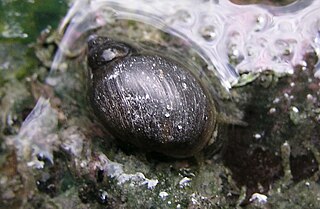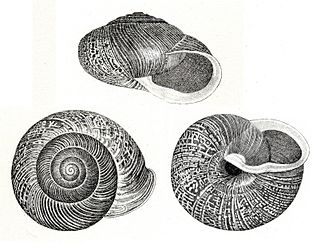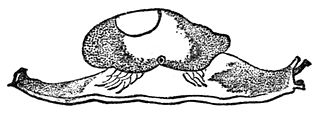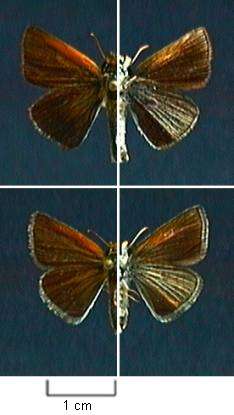The conservation status of a group of organisms indicates whether the group still exists and how likely the group is to become extinct in the near future. Many factors are taken into account when assessing conservation status: not simply the number of individuals remaining, but the overall increase or decrease in the population over time, breeding success rates, and known threats. Various systems of conservation status are in use at international, multi-country, national and local levels, as well as for consumer use such as sustainable seafood advisory lists and certification. The two international systems are by the International Union for Conservation of Nature (IUCN) and The Convention on International Trade in Endangered Species of Wild Fauna and Flora (CITES).

The Peary caribou is a subspecies of caribou found in the High Arctic islands of Nunavut and the Northwest Territories in Canada. They are the smallest of the North American caribou, with the females weighing an average of 60 kg (130 lb) and the males 110 kg (240 lb). In length the females average 1.4 m and the males 1.7 m.
The Species at Risk Act is a piece of Canadian federal legislation which became law in Canada on December 12, 2002. It is designed to meet one of Canada's key commitments under the International Convention on Biological Diversity. The goal of the Act is to prevent wildlife species in Canada from disappearing by protecting endangered or threatened organisms and their habitats. It also manages species which are not yet threatened, but whose existence or habitat is in jeopardy.
The Committee on the Status of Endangered Wildlife in Canada is an independent committee of wildlife experts and scientists whose "raison d'être is to identify species at risk" in Canada. It designates the conservation status of wild species.

The Banff Springs snail is a species of small air-breathing freshwater snail in the family Physidae.

Lampsilis cariosa, the yellow lampmussel, is a species of freshwater mussel, an aquatic bivalve mollusk in the family Unionidae, the river mussels.

Sagittunio nasutus, the eastern pondmussel, is a species of freshwater mussel in the family Unionidae, the river mussels.
Cryptomastix devia, common name the Puget Oregonian snail, is a species of air-breathing land snail, a terrestrial pulmonate gastropod mollusc in the family Polygyridae.

Allogona townsendiana, common name the Oregon forestsnail, is a species of air-breathing land snail, a terrestrial pulmonate gastropod mollusc in the family Polygyridae.
Physella wrighti, common name the hotwater physa, is a species of small air-breathing freshwater snail, an aquatic gastropod mollusk in the family Physidae.
Hemphillia dromedarius, the dromedary jumping-slug, is a species of air-breathing land slugs, terrestrial pulmonate gastropod mollusks in the family Binneyidae.

Hemphillia is a genus of air-breathing land slugs, terrestrial pulmonate gastropod mollusks in the family Binneyidae.

Hemphillia glandulosa, the warty jumping-slug, is a species of air-breathing land slug, a terrestrial pulmonate gastropod mollusk in the family Binneyidae.

Gonidea angulata, the western ridged mussel or Rocky Mountain ridged mussel, is a species of freshwater mussel, an aquatic bivalve mollusk in the family Unionidae, the river mussels. It is the only species in the genus Gonidea.
Lyogyrus granum, common name the squat duskysnail, is a species of very small or minute freshwater snail with a gill and an operculum, an aquatic gastropod mollusk in the family Hydrobiidae.
Deroceras hesperium, common name the evening fieldslug, is a species of air-breathing land slug, a terrestrial pulmonate gastropod mollusk in the family Agriolimacidae.
Physella parkeri, the Broadshoulder Physa, is a species of small air-breathing freshwater snail.
Hungerford's crawling water beetle is a critically endangered member of the family Haliplidae of water beetles found in northeastern North America. The US Fish and Wildlife Service Draft Recovery Plan for the species published in August 2004 estimates roughly 1000 individuals are present in the wild. In 2010, a five-year summary report by the United States Fish and Wildlife Service found the population to be essentially unchanged.

Oarisma poweshiek, the Poweshiek skipperling, is a North American butterfly in the family Hesperiidae (skippers), subfamily Hesperiinae. The range of this species in Canada is restricted to southeastern Manitoba, and in the United States it historically ranged from the Dakotas to the southern Lower Peninsula of Michigan.

Dolphin and Union Caribou, Dolphin and Union caribou herd, Dolphin-Union, locally known as Island Caribou, are a migratory population of barren-ground caribou, Rangifer tarandus groenlandicus, that occupy Victoria Island in the Canadian Arctic Archipelago and the nearby mainland. They are endemic to Canada. They migrate across the Dolphin and Union Strait from their summer grazing on Victoria Island to their winter grazing area on the Nunavut-Northwest Territories mainland in Canada. It is unusual for North American caribou to seasonally cross sea ice and the only other caribou to do so are the Peary caribou who are smaller in size and population. They were listed as Endangered by Committee on the Status of Endangered Wildlife in Canada (COSEWIC) since November 2017.









